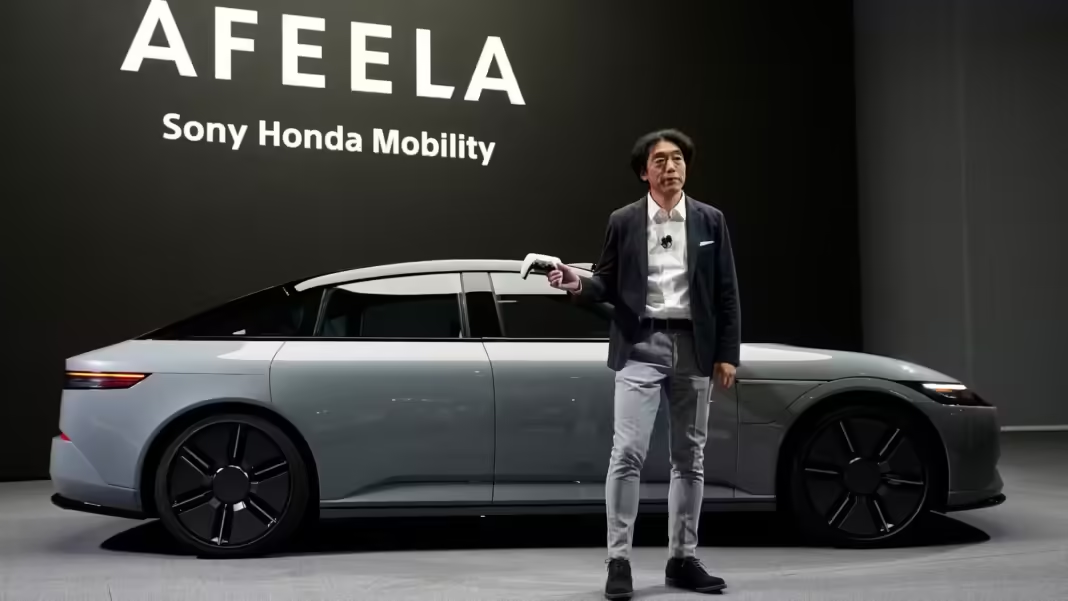Sony Group, a global technology and entertainment conglomerate, is embarking on a bold and transformative journey in the electric vehicle (EV) sector. The company is joining forces with strategic partners to reshape the automotive landscape, leveraging its technological expertise and innovative prowess to not only develop EVs but also to reimagine cars as versatile entertainment spaces. This strategic move comes at a time when the automotive industry is undergoing a seismic shift towards electric propulsion, autonomous driving, and connectivity, presenting both challenges and opportunities for traditional players and newcomers alike.
As the world transitions towards more sustainable transportation solutions, the shift to electric cars has become a dominant trend. Electric vehicles offer numerous advantages, including lower emissions, reduced reliance on fossil fuels, and quieter operation. With EVs being easier to manufacture than those with internal combustion engines, the automotive landscape has become more accessible to new entrants. Companies like Sony are capitalizing on this shift to contribute their technological expertise to the evolution of mobility.
Simultaneously, the convergence of autonomous driving technology and 5G connectivity is poised to redefine cars from mere transportation devices to mobile platforms for information and entertainment services. As cars become more connected, they have the potential to offer a seamless blend of entertainment, connectivity, and productivity. The integration of cutting-edge technology within vehicles opens the door to an array of possibilities, ranging from personalized infotainment to immersive experiences that can redefine how people perceive travel.
Sony’s strategic approach to EVs is not only a response to market trends but also a recognition of the transformative potential that lies ahead. Izumi Kawanishi, Senior General Manager overseeing Sony’s Mobility business, highlighted the risk of ignoring EVs as greater than the challenges they pose. He likened the impending transformation of the automotive industry to the paradigm shift that turned conventional phones into smartphones, emphasizing the significance of embracing change and innovation to stay competitive.
Sony’s commitment to this endeavor was solidified with the announcement of its new mobility unit at the CES technology fair in Las Vegas. The company’s CEO, Kenichiro Yoshida, hinted at the ambition to transform its EV development project into a revenue-generating venture. This strategic pivot underscores Sony’s intention to leverage its technological strengths to make a mark in the EV market and redefine the relationship between technology and transportation.
The collaboration between technology and automotive expertise is evident in Sony’s partnerships. The company has already built two EV “Vision” prototypes in collaboration with Magna International, a Canadian auto parts manufacturer known for its contributions to brands like BMW, Mercedes Benz, and Toyota. This partnership not only provides Sony with the necessary manufacturing capabilities but also highlights the cross-industry collaborations that are shaping the future of mobility.
Moreover, Sony’s European-based project involves essential contributions from established industry players. Partners like Bosch, a German auto parts manufacturer, Valeo SE, a French automotive technology company, and AImotive, a Hungarian autonomous vehicle startup, collectively contribute to Sony’s EV initiative. These partnerships exemplify the collaborative approach required to navigate the intricate challenges associated with reshaping the automotive sector.
Bringing an EV to market involves significant investments in manufacturing facilities and equipment. Tesla, a frontrunner in the EV space, has spent billions to establish its market presence. Sony is not only competing with traditional automakers like Toyota, General Motors, and Volkswagen, but it is also navigating a highly competitive landscape against new entrants and established players from the technology sector, such as Apple, LG Electronics, and Foxconn.
The challenges and opportunities in the EV space extend beyond manufacturing. The integration of autonomous capabilities and connectivity requires rigorous technological advancements. Lidar technology, which employs laser light pulses for accurate object detection and mapping, is a key enabler of autonomous driving. While Sony embraces lidar, Tesla has notably eschewed it in favor of other sensor technologies, highlighting the diversity of approaches in the industry.
Sony’s venture into the electric vehicle (EV) market underscores a growing trend among technology companies to explore the realm of automotive possibilities. This phenomenon signifies a recognition of the transformative potential that arises from blending technology and transportation, paving the way for novel solutions that reimagine the mobility experience. The convergence of 5G connectivity, artificial intelligence, and advanced sensor technologies serves as a catalyst for ushering in a new era of transportation that is both innovative and interconnected.
In essence, Sony’s strategic collaboration in the EV sector serves as a testament to the company’s unwavering commitment to innovation and transformation. The global shift towards electric vehicles, coupled with remarkable advancements in autonomous technology and seamless connectivity, has created fertile ground for reshaping the traditional automotive landscape. Sony’s strategic partnerships, fortified by its technological prowess and visionary approach, position it as a pivotal agent of change in this transformative journey. This fusion of technological innovation and automotive expertise is poised to redefine the very essence of mobility and transportation, leaving an indelible impact for generations to come.
As Sony navigates this dynamic and evolving landscape, its trajectory exemplifies the profound potential of technology companies to reshape industries and redefine the future. The company’s foray into the EV market is not merely an isolated endeavor but rather a manifestation of a broader trend that underscores the symbiotic relationship between technology and transportation. This paradigm shift transcends conventional boundaries and envisions vehicles as not just modes of conveyance but integrated platforms that seamlessly integrate entertainment, connectivity, and information services.
In the grand tapestry of innovation, Sony’s journey signifies a pioneering spirit that is crucial for navigating uncharted territories. The transformative impact of combining technological ingenuity with automotive aspirations holds the promise of revolutionizing how we perceive and engage with transportation. As Sony charts its course in this ever-evolving landscape, its endeavors underscore the potential of visionary companies to reshape industries, elevate consumer experiences, and redefine the future of mobility.












